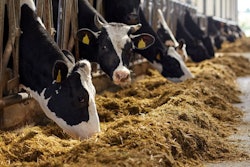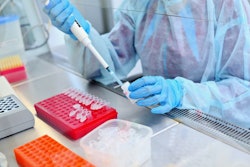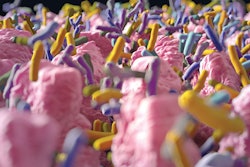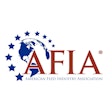Starting large-scale project using feed additive Bovaer
European dairy cooperative Arla Foods and global purpose-led science-based company, Royal DSM, are set to start a large-scale on-farm pilot with the methane reducing feed additive Bovaer on 10,000 dairy cows across three European countries. Long-standing global research and on-farm trials show that Bovaer can reduce methane emissions by around 30% with continued high animal welfare, supporting the companies’ commitment to sustainable dairy production.
Methane emission is one of the dairy industry’s biggest climate challenges. Cows are ruminants, meaning that to digest their feed they continuously burp, releasing methane which affects climate change. In fact, 40% of total emissions from Arla Foods’ farms come from their cows’ digestion of feed.
Arla Foods’ farmer owners are among the most climate efficient dairy producers in the world with an average C02e emission of 1.15kg per kg of raw milk. They are committed to accelerate their reduction of greenhouse gas emissions in this decade. In line with Arla Foods ambitious sustainability targets across its value chain, the cooperative is set to pilot the use of the new feed additive Bovaer with 10,000 dairy cows across more than 50 farms in Denmark, Sweden and Germany. The feed additive could reduce methane emissions by around 30%.
“Climate change requires urgent action, and we believe that dairy is part of the solution. The results from our initial trials with Bovaer at both a research facility and one of our Danish farms are very promising. Together with DSM, we are now gaining practical on-farm experience by applying the feed additive in one of its largest pilot programs to date, and one of Arla’s biggest climate projects overall, with 10,000 cows. This is a great example of innovative scientific solutions and actions we are taking to create a sustainable and resilient future for dairy and I am excited to see how far this will take us,” says executive vice president and head of agriculture and sustainability at Arla Foods, Hanne SØndergaard.
“Leaders of more than 100 countries recognize the urgency of cutting methane emissions as they pledged to make a difference at the UN Climate Change Conference, COP26, a few months ago. The recent IPCC report on the impact of climate change tells us there’s no time to lose when it comes to reducing greenhouse gas emissions. Transforming livestock farming will be key to this and forward-thinking companies like Arla Foods are already working hard on sustainable dairy. Through our scientific innovation and collaboration, we can help achieve a sizeable reduction in emissions by changing the feed that animals eat every day and in doing so, support the health of animals, people and planet,” says Mark van Nieuwland, vice president of Bovaer at DSM.
Proven climate solution
Bovaer is a feed additive for cows and other ruminants. DSM has researched and developed this additive over ten years and extensively tested in 14 countries around the world. Bovaer is available for sale in the EU, Brazil, Chile and Australia. In the EU, it is the first ever approved feed additive with environmental impact, confirming its impact on methane emissions and its safety for animals, consumers and the environment.
Bovaer works by suppressing the enzyme that triggers methane production in a cow’s digestive system. It takes effect immediately and is safely broken down into compounds already naturally present in a cow’s stomach and is scientifically proven to not affect the milk quality. Just a quarter of a teaspoon of Bovaer added daily to each cow’s feed will enable a consistent reduction in methane emissions of 30%, on average. This feed additive therefore contributes to a significant and immediate reduction in the environmental footprint of meat and dairy products.
The on-farm pilots in practice
Throughout the summer and fall of 2022, Arla Foods will work with its farmer owners to ensure a diverse group of farms for the pilot program. During the on-farm pilots, farmers will receive Bovaer from their feed suppliers and mix it into the feed for their dairy cows. Arla will collect milk samples for analysis and comparison to milk from dairy cows not fed the feed additive. If preliminary findings are as expected, Arla Foods plans to double the pilot project to include 20.000 cows in 2023.
About DSM and the company’s climate commitments
Royal DSM is a global, purpose-led company in Health, Nutrition & Bioscience, applying science to improve the health of people, animals and the planet. DSM’s purpose is to create brighter lives for all. DSM’s products and solutions address some of the world’s biggest challenges while simultaneously creating economic, environmental and societal value for all its stakeholders customers, employees, shareholders, and society at large. The company was founded in 1902 and is listed on Euronext Amsterdam.
With its Food System Commitments, DSM addresses several of the most urgent societal and environmental challenges facing the world’s food consumption and production up to 2030. One of its commitments is to enable a 20% reduction in greenhouse gas emissions in dairy production. Since the end of last year, Bovaer@ has been approved for use in Brazil and Chile, and, at the start of 2022, it also received EU approval.
About Arla Foods and the cooperative’s climate commitments
Arla Foods is an international dairy company owned by more than 8,900 farmers from Denmark, Sweden, the UK, Germany, Belgium, Luxembourg, and the Netherlands. Arla Foods is one of the leading players in the international dairy arena with well-known brands like Arla, Lurpak, Puck and Castello. Arla Foods is focused on providing good dairy nourishment from sustainable farming and operations and is also the world’s largest manufacturer of organic dairy products.
The cooperative is committed to limiting global warming to 1.5 C and is one of the first farmer owned dairy cooperatives in the world to have a 1.50 C target for scopes 1 and 2 (63%reduction of greenhouse gas emissions by 2030) approved by the Science Based Targets Initiative (SBTi) under the Paris Agreement. The 30% reduction target for scope 3, covering among other things the Arla farms continue to meet the SBTi’s criteria for ambitious value chain goals in line with current best practice.
Arla Foods is the first European dairy cooperative to introduce climate checks across seven European countries, creating one of the world’s largest sets of externally verified climate data from dairy farming and supporting its farmer owners in their commitment to accelerate their reduction of greenhouse gas emissions in this decade.









